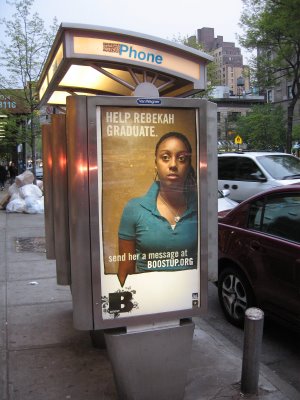Shieva K. took photos of these two posters, both part of the Boost Up campaign in New York City. Both were posted on the Upper West Side.
The Boost Up campaign is a joint venture between the U.S. Army and the Ad Council to encourage kids to stay in school. The ads feature actual teens who are at risk of dropping out of high school. When you go to the website, you can read a bio about each teen, including the difficulties they face in their home lives, etc. Then you can send a student a “boost,” meaning an email, text message, or post on FaceBook or YouTube, encouraging them to stay in school. You can also watch videos the teens have made about their lives.
The thing I find interesting about this campaign is the lack of any discussion of structural reasons these teens (predominantly racial/ethnic minorities) might be at risk of dropping out of school, or what that might have to do with wealthy people on the Upper West Side. Both the problem and the solution are presented as individual-level issues: teens struggle mostly because they have problems with their parents and unstable home lives, and we can help fix this problem by sending text messages saying “You can do it!” It’s “activism” with no actual need to get involved or think deeply about the problem–we don’t need to change the way schools are funded, wonder whether people who send their kids to private schools still have any responsibility to the public education system, or think about things like poverty, race, crumbling schools, and other structural issues that exist beyond the individual.
I guess any effort is better than nothing, but it seems like we’re basically saying, “Hey, kids! Overcome all your problems by thinking positively and having some strangers who have never met you, and probably can’t even begin to imagine what your life is like, spend 30 seconds writing you a message! That’s all it should really take, so if you still drop out of school, you must not have tried hard enough.” It fits very well into the American cultural ideology that I find so often among my students, the belief that anyone can overcome any disadvantage or hardship if they just try hard enough and “don’t give up”; if they don’t, they’re either lazy, didn’t believe in themselves, or in some other way are to blame. Regardless, there’s not much the rest of us can do about it.
Thanks, Shieva!


Comments 2
Annie — May 17, 2008
I am surprised no one commented on this, since our schools and children are such a crucial aspect of our future; who is going to take care of everyone in their old age? Children are, and the future laws, policies and careers they build in the future.
There is a lot that is wrong with the public school system, and needing more money isn't the main problem, it is how they are using that money, and teaching our children. I have talked with teachers and parents alike, and all mention how the obsessive trend of 'teaching to the test' is causing so much damage to the quality of education given and the children themselves.
Not long ago a teacher was on television saying how upset she was over the fact that teachers were held accountable for the outcome of how well their students did on tests, and that there were other ways that teachers could be judged on thier teaching ability. YET, we are judging a child's ability _though_ testing. A test that can make or break a child's academic self esteem? We want to protect a teacher's self esteem, but not a child's? Obviously there is more to teaching than pouring money into a school. The very foundations of _how_ we teach and the attitudes of many of _those who teach_ need to be changed.
To keep a child in school they have to like learning, and feel they are actually gaining something by being in school. And if public schools are not accomplishing that, we have a problem. And we need to do way more than send "keep your chin up" emails :)
sam 8659960 — June 25, 2024
The Salesforce Advanced Administrator certification is designed for experienced Salesforce administrators who have mastered the skills necessary to leverage the advanced features and capabilities of Salesforce. This certification Advanced-Administrator validates an individual's ability to manage advanced configuration, automation, and security tasks within Salesforce, and demonstrates proficiency in optimizing and extending the platform for business needs.